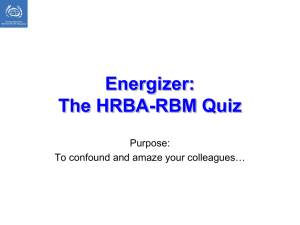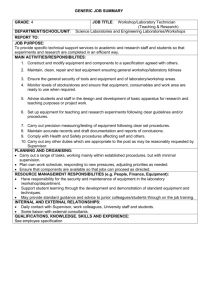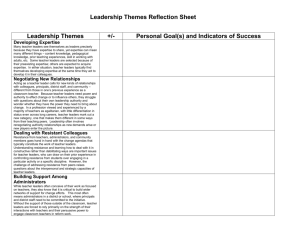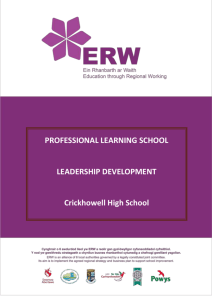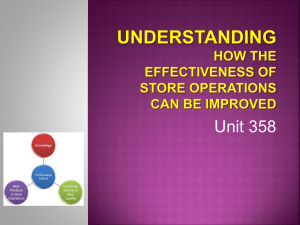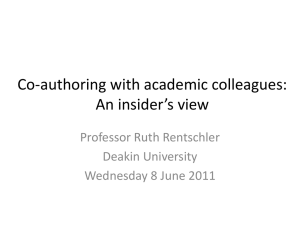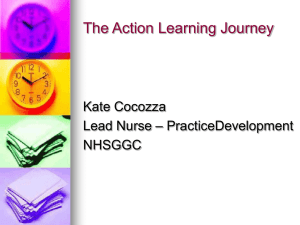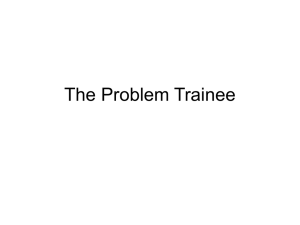R.B.K.C. Corporate Templates
advertisement
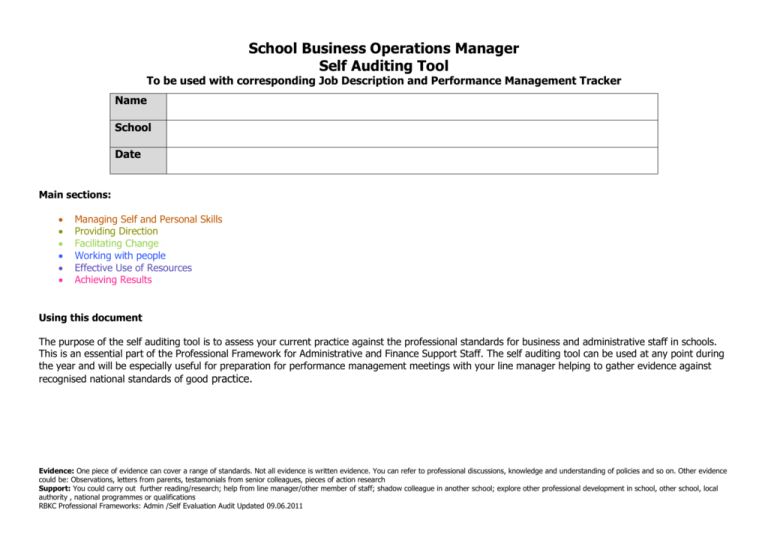
School Business Operations Manager Self Auditing Tool To be used with corresponding Job Description and Performance Management Tracker Name School Date Main sections: Managing Self and Personal Skills Providing Direction Facilitating Change Working with people Effective Use of Resources Achieving Results Using this document The purpose of the self auditing tool is to assess your current practice against the professional standards for business and administrative staff in schools. This is an essential part of the Professional Framework for Administrative and Finance Support Staff. The self auditing tool can be used at any point during the year and will be especially useful for preparation for performance management meetings with your line manager helping to gather evidence against recognised national standards of good practice. Evidence: One piece of evidence can cover a range of standards. Not all evidence is written evidence. You can refer to professional discussions, knowledge and understanding of policies and so on. Other evidence could be: Observations, letters from parents, testamonials from senior colleagues, pieces of action research Support: You could carry out further reading/research; help from line manager/other member of staff; shadow colleague in another school; explore other professional development in school, other school, local authority , national programmes or qualifications RBKC Professional Frameworks: Admin /Self Evaluation Audit Updated 09.06.2011 1. Managing self and personal skills Manage own resources: this is about managing personal resources (particularly knowledge, understanding, skills, experience and time) in order to achieve work objectives, understanding how the work role fits into the overall vision and objectives of the school(s). Maintain CPD: this is about career and personal goals while also understanding values and wider personal aspirations. It requires conscientiously maintaining CPD and keeping up to date on school business management developments and wider educational issues. Develop personal networks: this is about developing personal networks to support both current and future work. Personal networks may include people in the school, people from other schools and organisations and people in contact on the telephone or via the internet. Maintain professional values and ethics: this requires upholding the reputation of the school business management profession by raising the profile of the profession and being an exemplary role model. This entails acting with integrity, honesty, loyalty and fairness, and acting within the limits of professional competence. It involves safeguarding the assets and reputation of the school(s) and ensuring financial probity and truthfulness in all public communications, including not accepting gifts, hospitality or services that may appear improper Performance and Criteria Managing own resources Maintain CPD Professional attributes Commits to CPD for self and others. Receives feedback and support on own performance. Models high standards of professional conduct. Acts with integrity and fairness at all times. Maintains relationships with others in an ethical and appropriate manner. Applies the principle of confidentiality both within and outside of the school. Engages with other schools and agencies. Encourages an open, fair and equitable culture for learning. Knowledge and understanding Professional development and personal development planning (PDP) principles. Tools and techniques for time management, planning, delegation and principles of work– life balance. Professional specific requirements relating to maintenance and development of knowledge, skills, understanding and CPD. Information and resources gained through personal networks and principles of confidentiality in exchanging information. Networking opportunities with professional colleagues including professional associations, unions, government agencies, conferences, seminars, local groups, discussion forums, consultation processes, development programmes and online communities. Coaching and mentoring techniques. Collaborative learning cultures. Guidance from national, regional and local education bodies on professional matters and codes of professional conduct. Roles, responsibilities, accountabilities, conflicts of interest and whistle-blowing. Meeting standard I need support meeting this standard Evidence collected Action required Date Delegates tasks, responsibilities and maximises use of own resources. Ensures school priorities are kept to the fore. Proactively identifies own professional needs in response to national initiatives and ensures that these are planned for, and met, through professionally recognised qualifications. Actively seeks feedback, both formally and informally, and acts on it, setting own personal development plans. Evidence: One piece of evidence can cover a range of standards. Not all evidence is written evidence. You can refer to professional discussions, knowledge and understanding of policies and so on. Other evidence could be: Observations, letters from parents, testamonials from senior colleagues, pieces of action research Support: You could carry out further reading/research; help from line manager/other member of staff; shadow colleague in another school; explore other professional development in school, other school, local authority , national programmes or qualifications RBKC Professional Frameworks: Admin /Self Evaluation Audit Updated 09.06.2011 Develop personal networks Maintain professional values and ethics Develops professional communities by investigating good practice in other schools and disseminating those as well as celebrating good practice in own school. Extends networking opportunities including mechanisms such as conferences, seminars, local groups, discussion forums, professional development programmes and online communities. Makes active use of the information and resources gained through personal networks to develop own skills and contributes to Contributes significantly to local and national networking groups and actively responds to consultations and dialogues as well as coaching, supporting and advising other professional colleagues. Actively promotes and develops the SBM role. Acts with integrity, honesty, loyalty and fairness, always within the limits of professional competence, to safeguard the assets, financial probity and reputation of the school. Evidence: One piece of evidence can cover a range of standards. Not all evidence is written evidence. You can refer to professional discussions, knowledge and understanding of policies and so on. Other evidence could be: Observations, letters from parents, testamonials from senior colleagues, pieces of action research Support: You could carry out further reading/research; help from line manager/other member of staff; shadow colleague in another school; explore other professional development in school, other school, local authority , national programmes or qualifications RBKC Professional Frameworks: Admin /Self Evaluation Audit Updated 09.06.2011 2. Providing direction Provide leadership: this is about providing direction to people in the school or groups of schools, that is, clusters, federations or extended services schools and enabling, inspiring, motivating and supporting them to achieve the school plan. Plan school improvement: this involves having a clear and up-to-date picture of the environment in which the school(s) operate and producing information which is used for strategic planning, enabling a clear sense of direction and viable long-term plans. Strategic plans take account of the diversity, values and experience of the school and community at large. Once the school improvement plan has been developed and agreed it needs to be put into action utilising distributed leadership principles. It also involves agreeing standards for measuring success, carefully monitoring the implementation of the plan and making adjustments along the way, a process that may need a lot of dialogue, flexibility and openness to change. Ensure compliance with legal, regulatory, ethical and social requirements: schools must show that they act responsibly in relation to their staff, pupils and the communities that they support. All schools must obey the law in key areas such as governance, health and safety, employment and finance. Schools also have to work within specific educational policy regulations and ethical frameworks. Schools who want to maintain a good reputation also have to take account of the views of people in their communities on a whole range of issues such as the environment, Every Child Matters, extended services and the other ways in which the school affects pupils, people and the community. Manage risk: providing direction also involves taking the lead in establishing and operating effective risk management processes across the school(s). This involves systematically identifying, evaluating and prioritising potential risks and communicating information to enable appropriate decisions and actions to be taken. Foster school culture: this involves developing the school cultures based on assumptions and values about learning, working life and relationships Performance and Criteria Provide Leadership Professional attributes Articulates the vision and values of the school. Ensures organisational and strategic planning support the purpose, values and vision of the school(s). Takes decisions to allocate resources including capital and people to facilitate the strategic planning. Ensures financial probity and accountability frameworks are adhered to. Sets clear boundaries for colleagues and self-ensuring compliance with legal and ethical frameworks. Develops own leadership capability and that of other people. Assesses and manages risk. Fosters school culture. Knowledge and understanding Models of effective leadership and organisational structures common within the education sector. Current and emerging social attitudes to educational leadership and practice. Ways to ensure organisational and strategic plans support the purpose, vision and values of the school(s). Ways to receive feedback on own leadership performance and ways to develop the leadership capability in others. Strategic planning processes, tools and techniques. Methods for measuring and monitoring performance against plans. Legal requirements covering the governance and ethical and value-based approaches to school governance. Legal, regulatory, ethical and social requirements. Ways to assess, manage and develop leadership commitment to risk management, contingency planning and risks associated with schools including site security, disaster recovery plans, crisis and emergency planning, health and safety requirements, fire safety etc. Styles of organisational culture within education. Values, assumptions and behaviours consistent with various school cultures. Meeting standard I need support meeting this standard Evidence collected Action required Date Undertakes a key role within the SLT. Uses different and appropriate leadership styles in different situations and seeks and makes use of feedback on leadership performance. Fosters and facilitates the development of actual Evidence: One piece of evidence can cover a range of standards. Not all evidence is written evidence. You can refer to professional discussions, knowledge and understanding of policies and so on. Other evidence could be: Observations, letters from parents, testamonials from senior colleagues, pieces of action research Support: You could carry out further reading/research; help from line manager/other member of staff; shadow colleague in another school; explore other professional development in school, other school, local authority , national programmes or qualifications RBKC Professional Frameworks: Admin /Self Evaluation Audit Updated 09.06.2011 Plan School improvement Ensure compliance with legal, regulatory, ethical and social requirement Manage risk Foster School Culture and potential school partnership opportunities. Identifies and takes steps to deal with inhibitors and blockers in a fair and equitable manner. Takes a leading role in the development and implementation of the strategic school improvement plan and future resource requirements. Develops processes whereby governors can effectively meet their responsibilities. Works strategically with the governing body. Monitors compliance with legal, regulatory, ethical and social requirements across the school. Identifies potential risks in relation to achieving strategic objectives and makes effective contingency plans. Implements proportionate business continuity plans, demonstrating a secure knowledge of the principles of strategic management and school improvement planning. Contributes to and models the vision, values, moral purpose, learning styles, leadership styles and ethos of the school in a purposeful and inclusive manner. Understands the national and global political, economic, social, technological, legal and environmental trends that may impact on educational practice and strategic intent. Fosters a learning culture in which individual and collective success is recognised and celebrated. Develops a whole-school culture of best practice in teaching and learning. Evidence: One piece of evidence can cover a range of standards. Not all evidence is written evidence. You can refer to professional discussions, knowledge and understanding of policies and so on. Other evidence could be: Observations, letters from parents, testamonials from senior colleagues, pieces of action research Support: You could carry out further reading/research; help from line manager/other member of staff; shadow colleague in another school; explore other professional development in school, other school, local authority , national programmes or qualifications RBKC Professional Frameworks: Admin /Self Evaluation Audit Updated 09.06.2011 3. Facilitating change Plan, lead and implement organisational change: this is about the planning that is required to make a specific change or to put into practice a programme of change. It involves developing a strategy to make the change that is needed, taking note of barriers, risks and the need to put appropriate monitoring and communication systems in place. The driving force for change may be external or internal to the school(s) or a mixture of both. It may be a reaction to events or an attempt to improve the school(s) for the future. This reflects the need, in many situations, for someone to take control and to provide a lead within the overall school(s) for a specific change or a wider programme of change. It involves leading the vision in terms of what the change is aiming to achieve and supporting the people involved in the practicalities of making the vision a reality. Develop innovation: this involves encouraging and supporting the identification and practical implementation of innovative ideas across school(s). Ideas may come from people working for the school or beyond the school externally to support new school services, improvements to existing school services and improvements to existing practices, procedures, systems, ways of working etc across the school(s) or those of pupils, local communities and suppliers. Build capacity for organisational change: leadership of the strategy and associated plans for a specific change or programme of change within the school(s) is required. This involves putting in place the necessary resources and supporting systems, including monitoring and communications, to turn the ‘vision’ into a practical reality. Performance and Criteria Plan, lead and implement organisational change Develop innovation Professional attributes Thinks conceptually to support and develop change processes. Encourages innovative thinking at all levels. Plays a full role in enabling, leading and managing successful change. Develops the potential of individuals. Fosters an inclusive and innovative learning environment to move the school forward. Develops a culture of innovation and continuous improvement. Engages with and values the contribution of others. Knowledge and understanding Models, theories and methods for managing and leading organisational change. Planning techniques and how to assess risks and benefits associated with strategies and plans. Techniques for solving problems and how to take critical decisions. Current and emerging political, economic, social, technological, environmental and legal developments relating to change management in schools. Ways of achieving stakeholder and community engagement. Ways of motivating and encouraging innovative ideas to generate, develop and share ideas. Resources required to support and manage organisational change. Political, emotional, bureaucratic and resource barriers to change. Ways to recognise achievements and celebrate success. Meeting standard Evidence collected I need support meeting this standard Action required Date Leads change at whole-school level and engages with stakeholders to facilitate change across schools. Uses a range of models and methods for managing change effectively, and understands their strengths and weaknesses. Thinks strategically and analytically Leads whole-school innovation projects. Works with external specialists and experts and/or in partnership with other organisations to generate and develop ideas that might lead to proportionate innovation in a wider setting. Thinks creatively. Evidence: One piece of evidence can cover a range of standards. Not all evidence is written evidence. You can refer to professional discussions, knowledge and understanding of policies and so on. Other evidence could be: Observations, letters from parents, testamonials from senior colleagues, pieces of action research Support: You could carry out further reading/research; help from line manager/other member of staff; shadow colleague in another school; explore other professional development in school, other school, local authority , national programmes or qualifications RBKC Professional Frameworks: Admin /Self Evaluation Audit Updated 09.06.2011 Build capacity for organisational change Selects and applies different methods for motivating and encouraging people across the school(s) to generate, develop and share innovative ideas. Recognises and manages proportionate risk in innovation and encourages others to take acceptable risks in pursuing innovation. Uses appropriate methods for identifying and pursuing opportunities to work in partnership with external experts and/or in partnership with other organisations on the generation and development of ideas. Evaluates proposals and takes critical decisions to implement and resource organisational change projects. Selects and applies different methods for communicating, motivating and encouraging people across the school(s) through change management processes Evidence: One piece of evidence can cover a range of standards. Not all evidence is written evidence. You can refer to professional discussions, knowledge and understanding of policies and so on. Other evidence could be: Observations, letters from parents, testamonials from senior colleagues, pieces of action research Support: You could carry out further reading/research; help from line manager/other member of staff; shadow colleague in another school; explore other professional development in school, other school, local authority , national programmes or qualifications RBKC Professional Frameworks: Admin /Self Evaluation Audit Updated 09.06.2011 4. Working with people Allocate and monitor the progress of work: this is about ensuring that the work required is effectively planned and fairly allocated to individuals and/or teams. It involves monitoring the progress and quality of the work, reviewing and updating plans. Develop productive relationships with colleagues and stakeholders: this involves being aware of the roles, responsibilities, interests and concerns of colleagues and stakeholders and working with and supporting them in various ways. Through partnerships and other activities, playing a key role in contributing to the development of the education system as a whole and collaborating with others to raise standards locally and nationally. Recruit and support workforce planning: this requires taking a lead in identifying the workforce requirements and how these will be met. It involves considering the strategic objectives and plans of workforce deployment and ensuring there is an appropriate mix of staff to implement plans. It requires organisational structures that reflect the organisation’s values and enables the management systems, structures and processes to work effectively in line with professional standards, occupational standards and legal requirements. Manage staff performance and development: this involves supporting colleagues in identifying their learning and development needs and helping to provide opportunities to meet them; encouraging colleagues to take responsibility for their own learning and providing an ‘environment’ in which personalised learning is recognised and valued; and ensuring that effective strategies and procedures for staff induction, professional development and performance review are developed and maintained in line with legal requirements. It also requires helping team members address problems affecting their performance. These may be work related problems or problems arising from personal circumstances and involves discussing performance issues in a timely way with the team members concerned to help them find a suitable solution to their problem. Build, develop and lead teams: this requires building a team and managing it through its various stages of growth. It covers both teams set up for a particular project or to carry out a specific task and teams that are ongoing. It is equally relevant to new teams and to inherited existing teams in helping them to function effectively. Professional attributes Distributes leadership and management. Communicates effectively using an appropriate range of methods. Builds and maintains effective relationships with colleagues and stakeholders in a fair and equitable manner. Collaborates and networks with others to strengthen the school’s organisational capacity and contributes to the capacity in other schools. Establishes and sustains appropriate structures and systems for workforce planning, recruitment and performance management. Acknowledges excellence and challenges poor performance across the school. Demonstrates enthusiasm for and commitment to the learning process and personalised learning for all members of the school community. Develops, empowers and sustains individuals and teams Coaches and mentors others. Inspires, challenges and motivates others. Demonstrates effective working relationships and team working. Fosters an open, fair, equitable culture and manages conflict. Knowledge and understanding Plans of work and how to identify priorities, critical activities and available resources. Effective ways of regularly and fairly monitoring progress and quality of work against standards or levels of expected performance from teams and individuals. Different methods for communicating and cultures of colleagues and stakeholders. Methods to identify, meet information needs and expectations and consult with colleagues and stakeholders. Ways to recognise and manage political issues with colleagues and stakeholders. Legislation, regulation, policies and procedures and codes of practice requirements relating to employment, welfare, rights, equality and health and safety. Accountability frameworks and safeguarding children. Workforce planning and trends and developments relevant to education. Theories and models relevant to leading and managing people. Methods for encouraging, motivating and supporting teams and individuals to improve performance and recognise achievements. Providing fair, regular and useful feedback to colleagues on their work performance including performance management review and personal development planning processes. Specialist services available to support staff with personal problems. Benefits of learning for individuals and organisations and building an environment in which learning is valued and efforts to learn are recognised. Different learning activities and how to prioritise learning needs of individuals and organisational needs. Learning styles, inclusive and personalised learning and development processes. Education sector professional and occupational standards and frameworks to support Evidence: One piece of evidence can cover a range of standards. Not all evidence is written evidence. You can refer to professional discussions, knowledge and understanding of policies and so on. Other evidence could be: Observations, letters from parents, testamonials from senior colleagues, pieces of action research Support: You could carry out further reading/research; help from line manager/other member of staff; shadow colleague in another school; explore other professional development in school, other school, local authority , national programmes or qualifications RBKC Professional Frameworks: Admin /Self Evaluation Audit Updated 09.06.2011 Performance and Criteria Allocate and monitor the progress of work Develop productive relationships with colleagues and stakeholders Recruit and support workforce planning Manage staff performance and development Build, develop and lead teams development and maintenance of professional skills, knowledge and understanding pertinent to the children’s workforce. Induction and common core of skills and knowledge for the children’s workforce. Theories and models for effective teams, multi-professional networking and learning communities. Dealing effectively with conflict. Meeting standard I need support meeting this standard Evidence collected Action required Date Leads and monitors the quality and progress of work across whole-school teams. Plans work considering priorities and critical activities across whole-school teams. Consults with colleagues and stakeholders in relation to key whole-school decisions and activities taking account of views, priorities, expectations and risks. Leads whole-school workforce planning making effective contingency plans when required in line with legislation, regulation, professional and occupational standards, frameworks and codes of practice requirements. Implements workforce plans, demonstrating a secure knowledge of the principles of strategic workforce planning. Contributes to and models the values and vision of encouraging colleagues to take responsibility for their own learning and development in an inclusive manner. Seeks strategic sources and specialist learning expertise to deliver appropriate learning and development interventions for the whole school. Understands the local, national and international learning and development opportunities available to colleagues. Uses prompt and constructive feedback to teams and individuals to improve whole-school performance Strategically selects teams with relevant expertise, knowledge and skills to deliver whole-school activities. Leads multi-professional teams across the whole school. Understands the dynamics and role of cultures operating within and across teams. Evidence: One piece of evidence can cover a range of standards. Not all evidence is written evidence. You can refer to professional discussions, knowledge and understanding of policies and so on. Other evidence could be: Observations, letters from parents, testamonials from senior colleagues, pieces of action research Support: You could carry out further reading/research; help from line manager/other member of staff; shadow colleague in another school; explore other professional development in school, other school, local authority , national programmes or qualifications RBKC Professional Frameworks: Admin /Self Evaluation Audit Updated 09.06.2011 5. Effective use of resources Manage finance: this requires applying best practice and highest standards of school financial management to optimise value for money and maximise efficiencies utilising effective procurement processes, supply and fixed asset management. School financial management ensures that learning is at the centre of strategic planning and resource management. Planning, managing, monitoring and delegating responsibility for budgets for clearly defined activities is a key aspect of this. It also involves identifying the need for and obtaining additional finance to fund the school(s) proposed activities through fundraising, bids and asset management processes. Manage technology: this requires taking a strategic role in the development of new and emerging technology to enhance school business processes, curricular delivery, teaching and learning and enriching the experiences of users and learners. Technology will include information, communications technology, equipment, machinery and innovative technology to support teaching and learning outcomes and personalised learning strategies. It also involves practical solutions to integrate technologies and management information systems (MIS) to maximise efficiency and effectiveness. Advice from information and communications technology (ICT) specialists may be required to carry out this function. Manage health and safety: this is concerned with leading the overall approach to health and safety in the school or federation of schools. Contributing to the wellbeing and productivity of all the people who work for and use the services of the school, effective health and safety management decreases the risk of injury and ill health to people who use the organisation’s services. This requires ensuring the school meets legislative requirements thus minimising the likelihood of prosecution and consequent penalties. Advice from health and safety specialists may be required to carry out this function. Manage physical resources: this is about ensuring the availability of the physical resources (equipment, materials, premises, services and energy supplies) required to carry out planned activities in the school(s). It involves identifying the resources required, making the business case to obtain these resources, planning how they will be used effectively, efficiently, safely and securely, monitoring resource use and taking corrective action, if required. It requires effectively managing all resources necessary to support effective teaching and learning for all. Manage environmental impact: this is about managing work activities and resources in the school(s) in order to minimise the negative impact – and maximise the positive impact – they may have on the environment. It involves organising work activities and the use of resources efficiently, understanding their impact on Professional attributes Ensures organisational and strategic financial planning support the purpose, values and vision of the school(s). Accesses, analyses and interprets information. Applies principles and practice of school evaluation. Collects and uses a rich set of data to understand the strengths and weaknesses of the school’s resources. Makes professional, managerial and organisational decisions based on informed judgements. Combines the outcomes of regular school self-review with external evaluations in order to develop the school’s resources. Uses appropriate new technologies. Develops and sustains a safe, secure and healthy school environment. Manages the school efficiently and effectively. Committed to developing a sustainable and environmentally friendly learning environment. Knowledge and understanding Ways to prepare, manage and monitor budgetary systems that ensure value for money. Factors, processes and trends likely to affect the setting of budgets. Financial probity and safeguarding against fraudulent activities. School procurement and asset management processes. Tracking systems, analysing data and benchmark systems. Legal, regulatory and ethical requirements including audit and inspection requirements. Guidelines and codes of practice and any legislative, regulatory or ethical requirements in relation to types of and providers of funding in education. Effective principles for fundraising and grant writing. Extended service provision, commissioning and contracting. Trends and developments in supporting teaching and learning, personalised learning and practices delivering curricular in relation to technology. Legal requirements, government policies and education guidelines relating to using technology in education. Using technology to enhance organisational effectiveness. Financial or other incentives or support that may be available for investing in technology in your school for benchmarking against other similar schools. Education-specific legislation, regulations, guidelines and codes of practice relating to health and safety. Health and safety risks, issues and developments particular to education. Development of and access to school buildings and facilities. How to identify the range and calculate the quantity of resources required to undertake planned activities. Education sector requirements for managing environmental performance in your school(s). Healthy school initiatives. Evidence: One piece of evidence can cover a range of standards. Not all evidence is written evidence. You can refer to professional discussions, knowledge and understanding of policies and so on. Other evidence could be: Observations, letters from parents, testamonials from senior colleagues, pieces of action research Support: You could carry out further reading/research; help from line manager/other member of staff; shadow colleague in another school; explore other professional development in school, other school, local authority , national programmes or qualifications RBKC Professional Frameworks: Admin /Self Evaluation Audit Updated 09.06.2011 the environment and finding ways to reduce their negative impact and to increase their positive impact. Advice from environmental specialists may be required to carry out this function. Performance and Criteria Manage finance Manage technology Manage health and safety Manage physical resources Manage environmental impact Ways to develop and sustain a safe, secure and healthy school environment. Potential impact of resource use on the environment and actions to minimise any adverse impact. Meeting standard I need support meeting this standard Evidence collected Action required Date Manages budgets and maintains accurate financial information to assist effective monitoring to achieve the school’s educational goals and priorities. Plans long-term financial budgets considering value for money, school improvement plan priorities and trends affecting future school budgets. Proactively seeks and manages additional finance streams including fundraising, bids and asset management processes Promotes the effective use of technologies to support whole-school business management processes. Considers new and emerging technologies to extend and enhance teaching and learning experiences for pupils. Consults with colleagues and stakeholders to assess future technology requirements in line with the school strategy for managing technology, taking account of views, priorities, expectations and risks Develops an organisational culture in which health and safety is prioritised informing the school’s strategy, planning and decision making. Ensures that sufficient resources are allocated across the school to manage health and safety. Consults with others to identify, plan and monitor the use of required school physical resources. Evaluates past patterns of resource use and considers trends and developments likely to affect future demand for school physical resources. Monitors the quality and patterns of resource use continuously considering benchmarking techniques. Evaluates past patterns of school resource use on the environment and considers trends and developments likely to affect future school environmental issues. Uses resources in ways that are efficient and minimise adverse impacts on the environment. Evidence: One piece of evidence can cover a range of standards. Not all evidence is written evidence. You can refer to professional discussions, knowledge and understanding of policies and so on. Other evidence could be: Observations, letters from parents, testamonials from senior colleagues, pieces of action research Support: You could carry out further reading/research; help from line manager/other member of staff; shadow colleague in another school; explore other professional development in school, other school, local authority , national programmes or qualifications RBKC Professional Frameworks: Admin /Self Evaluation Audit Updated 09.06.2011 6. Achieving results Manage projects: this involves developing, agreeing, monitoring and implementing project plans. It also involves ensuring that the project achieves its key objectives and is completed to the satisfaction of the project sponsors and key stakeholders. Managing or leading a programme of complementary projects, within or across extended services, will strategically contribute to wider school improvement. Manage school processes: managing school business processes to make sure the school(s) deliver outputs that meet pupils’, adults’, local community and stakeholders’ needs. Adhering to school and legal requirements to ensure that learning is at the centre of all resource planning and delivery processes. Implement school service improvements: this involves delivering and organising excellent school services to support effective teaching and learning outcomes for children. This entails proactively addressing potential school service problems and addressing stakeholder concerns. It is also about ensuring quality provision by efficiently and effectively adapting systems to avoid repeated service problems, and leading school decisions to facilitate continual improvement to school services, informed through consultation with pupils, parents, staff and local community discussions. Develop and strengthen community services: this is about ensuring the school puts community-centred services first and markets these effectively. It is also about ensuring that the school’s vision, processes and systems are geared to delivering excellent school services through developing further community services, maintaining effective partnerships with other schools, other services and agencies for children, local authorities, higher education institutions and local employers Improve school performance: this is about overseeing the continuous improvement of the overall performance of the school or federation of schools in terms of services and teaching and learning outcomes. The emphasis is very much on identifying and implementing changes that will add value in the eyes of pupils, parents, local communities and other key stakeholders. It is about evaluating the school’s performance and raising standards through identifying the priorities for continuous quality improvement and by responding to government policy, ensuring that resources are effectively and efficiently used to achieve the school’s aims and educational objectives. Professional attributes Uses project management principles and processes to deliver continuous quality improvement. Adapts systems and levels of provision to raise attainment by supporting effective teaching and learning. Plans and manages services that meet the needs of the wider school community. Reviews the provision of services through consultation to keep abreast of local and national developments and initiatives. Ensures wider consultation informs strategic planning and decision making. Markets core services and extended services to the wider community. Uses data and benchmarking to set stretching targets to monitor whole-school performance. Knowledge and understanding Programme and project management tools and techniques commonly used within the education sector. Risks and contingencies common to the education sector. Education sector-specific legislation, regulations, guidelines and codes or practice relating to project management. Relevant education sector trends, developments and competitor performance that affect school business management processes. Legal, regulatory and other restrictions that may affect school plans. Local federations, clusters, collaboration and consortium arrangements, shared services and learning networks. Multi-agency work, benefits and risks of multi-agency working. Pupil voice, parent voice and citizen-centred services. Current and emerging trends that are likely to affect school community services. Wider curriculum beyond the school. Marketing frameworks and strategies. Benchmarks, measures, data and information to assess school performance. Evidence: One piece of evidence can cover a range of standards. Not all evidence is written evidence. You can refer to professional discussions, knowledge and understanding of policies and so on. Other evidence could be: Observations, letters from parents, testamonials from senior colleagues, pieces of action research Support: You could carry out further reading/research; help from line manager/other member of staff; shadow colleague in another school; explore other professional development in school, other school, local authority , national programmes or qualifications RBKC Professional Frameworks: Admin /Self Evaluation Audit Updated 09.06.2011 Performance and Criteria Manage projects Manage school processes Implement school service improvements Develop and strengthen community services Improve school performance Meeting standard Evidence collected I need support meeting this standard Action required Date Manages a programme of complementary school projects and monitors progress to achieve successful outcomes. Plans complementary school projects considering factors, priorities and contingencies affecting project management processes. Promotes the effective use of whole-school business management processes. Considers new and emerging technologies to extend and support school business processes to enhance teaching and learning experiences for pupils. Consults with colleagues and stakeholders to assess future school business processes taking account of views, priorities, expectations and risks. Develops and reviews a framework for marketing school services to a range of audiences. Ensures that sufficient resources are allocated across the school to manage effective marketing for school services. Consults with others to identify, review and implement whole-school improvement services. Evaluates past patterns of school services and considers trends and developments likely to affect future school service demand. Implements measures to listen to school service users to implement change and improvement. Proactively engages with and develops partnership initiatives with other schools, services, agencies, higher education institutions and local employers to further school community services. Ensures resources for learning experiences for pupils are linked into and integrated with the wider school community. Ensures a consistent and continuous school-wide focus on pupils’ achievements, using data and benchmarks to monitor whole-school performance. Demonstrates and articulates high expectations and sets stretching targets for the whole-school Community Challenges under-performance at all levels. Evidence: One piece of evidence can cover a range of standards. Not all evidence is written evidence. You can refer to professional discussions, knowledge and understanding of policies and so on. Other evidence could be: Observations, letters from parents, testamonials from senior colleagues, pieces of action research Support: You could carry out further reading/research; help from line manager/other member of staff; shadow colleague in another school; explore other professional development in school, other school, local authority , national programmes or qualifications RBKC Professional Frameworks: Admin /Self Evaluation Audit Updated 09.06.2011
